In Houston criminal cases, probation and incarceration represent two different paths following a conviction. While probation permits individuals to stay in their communities under supervision, incarceration involves serving time in jail or prison. This distinction is crucial, as probation can facilitate rehabilitation and maintain social stability, allowing individuals to fulfill their legal obligations without the disruptive impact of incarceration.
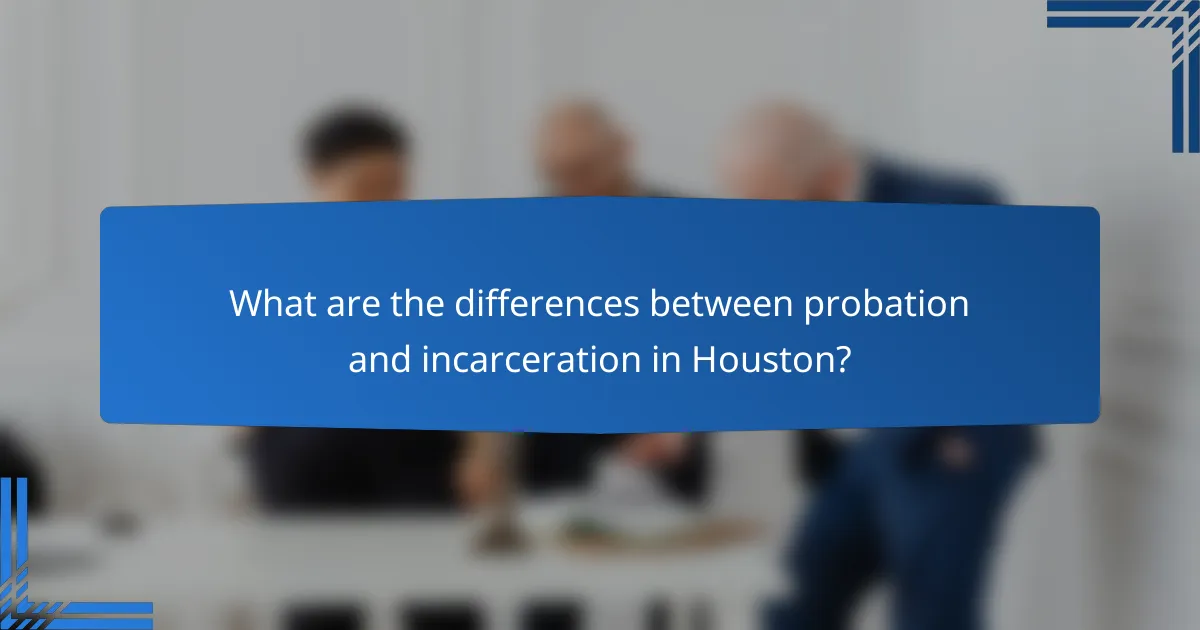
What are the differences between probation and incarceration in Houston?
Probation and incarceration are two distinct outcomes in Houston criminal cases. Probation allows individuals to remain in the community under supervision, while incarceration requires serving time in jail or prison.
Probation allows for community supervision
Probation is a court-ordered period of supervision in the community instead of serving time in jail. Individuals on probation must comply with specific conditions set by the court, which may include regular check-ins with a probation officer.
This option is often granted for less severe offenses, allowing offenders to maintain employment and family connections while still being held accountable for their actions.
Incarceration involves serving time in jail or prison
Incarceration means that an individual is sentenced to serve time in a jail or prison facility. The length of incarceration can vary widely based on the severity of the crime, ranging from a few days to several years.
This option removes the individual from the community entirely, impacting their ability to work and maintain personal relationships during their sentence.
Probation may include conditions like drug testing
Probation often comes with specific conditions that must be followed to avoid further legal consequences. These conditions can include mandatory drug testing, attending counseling sessions, or completing community service.
Failure to comply with these conditions can lead to revocation of probation and possible incarceration, making it crucial for individuals to understand and adhere to the requirements set by the court.
Incarceration typically results in loss of freedom
Incarceration leads to a significant loss of personal freedom, as individuals are confined to a facility for the duration of their sentence. This confinement affects daily life, including work, education, and family interactions.
Moreover, individuals may face long-term consequences after release, such as challenges in finding employment or housing due to their criminal record, making it essential to consider the implications of incarceration carefully.
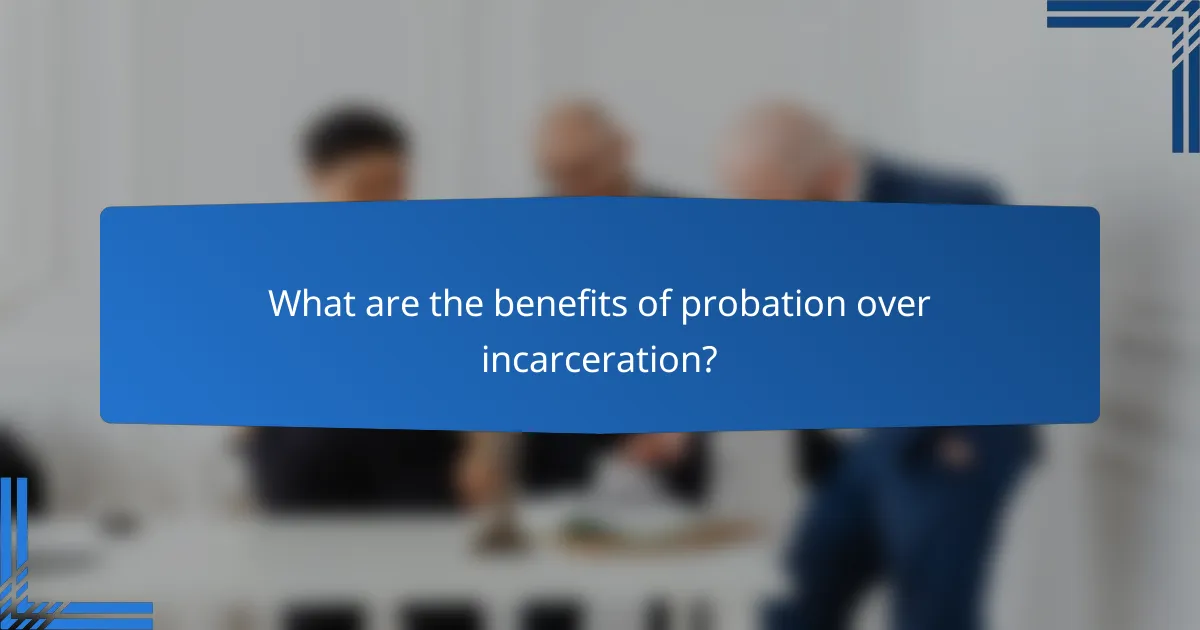
What are the benefits of probation over incarceration?
Probation offers several advantages compared to incarceration, primarily allowing individuals to remain in their communities while fulfilling legal obligations. This can lead to better outcomes in terms of employment, rehabilitation, and social stability.
Probation allows for maintaining employment
One of the key benefits of probation is that it enables individuals to keep their jobs. By avoiding incarceration, individuals can continue to earn an income, which is crucial for supporting themselves and their families.
Maintaining employment during probation can also facilitate a smoother reintegration into society. Many employers are more willing to hire individuals with probationary status than those who have served time in prison, which can help reduce recidivism rates.
Probation supports rehabilitation in the community
Probation allows individuals to participate in community-based rehabilitation programs, which can be more effective than traditional incarceration. These programs often include counseling, substance abuse treatment, and educational opportunities that address the root causes of criminal behavior.
Being in a familiar environment while receiving support can enhance personal growth and accountability. Probation officers often work closely with individuals to ensure they are meeting their rehabilitation goals, fostering a sense of responsibility.
Incarceration can lead to negative social impacts
Incarceration often results in significant negative social impacts, including the disruption of family structures and loss of community ties. Individuals who are incarcerated may struggle to maintain relationships with loved ones, which can lead to feelings of isolation and despair.
Moreover, the stigma associated with incarceration can hinder future employment opportunities and social reintegration. This cycle can perpetuate criminal behavior, making it harder for individuals to break free from the criminal justice system.
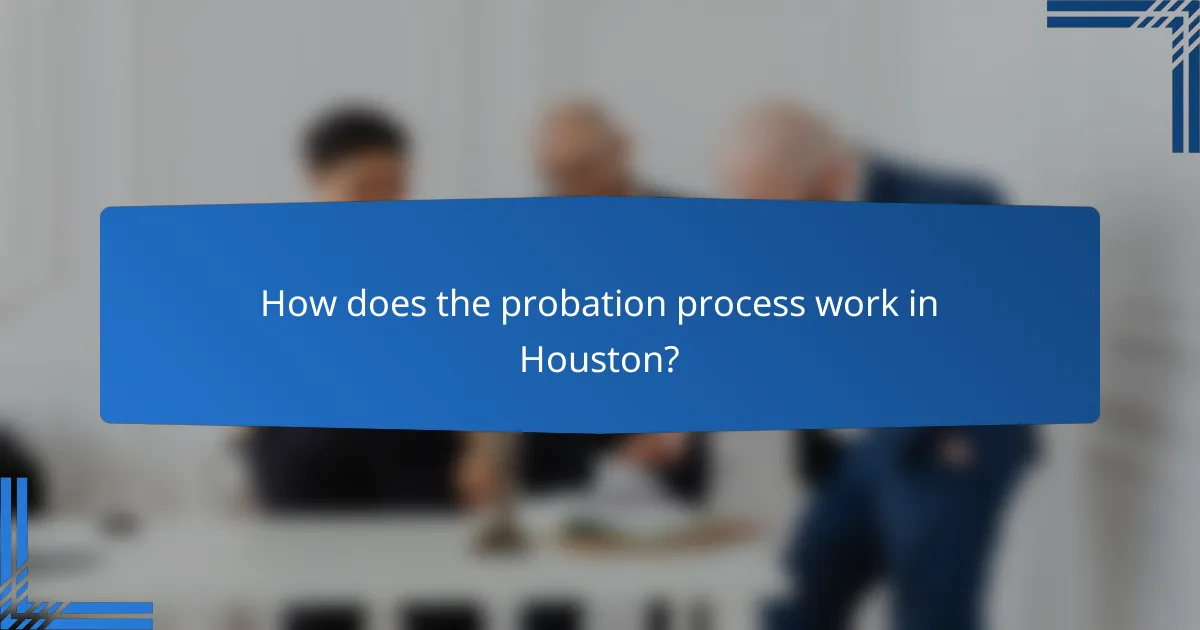
How does the probation process work in Houston?
The probation process in Houston allows individuals convicted of certain crimes to serve their sentences outside of jail, under specific conditions set by the court. This alternative to incarceration can provide a chance for rehabilitation while still holding individuals accountable for their actions.
Probation is granted by a judge
In Houston, probation is not automatically given; it must be granted by a judge during sentencing. The judge considers various factors, including the nature of the crime, the defendant’s criminal history, and their behavior during the trial. If probation is deemed appropriate, the judge will issue a probation order outlining the terms.
Probation terms are outlined in a court order
The court order specifies the conditions that the individual on probation must follow. These terms may include regular check-ins with a probation officer, community service, drug testing, and restrictions on travel. Violating any of these conditions can result in revocation of probation and potential incarceration.
Probation officers monitor compliance
Probation officers play a crucial role in ensuring that individuals adhere to the terms of their probation. They conduct regular meetings, check-ins, and may even perform home visits. Their goal is to support rehabilitation while ensuring compliance with court-ordered conditions, helping to reduce the likelihood of reoffending.
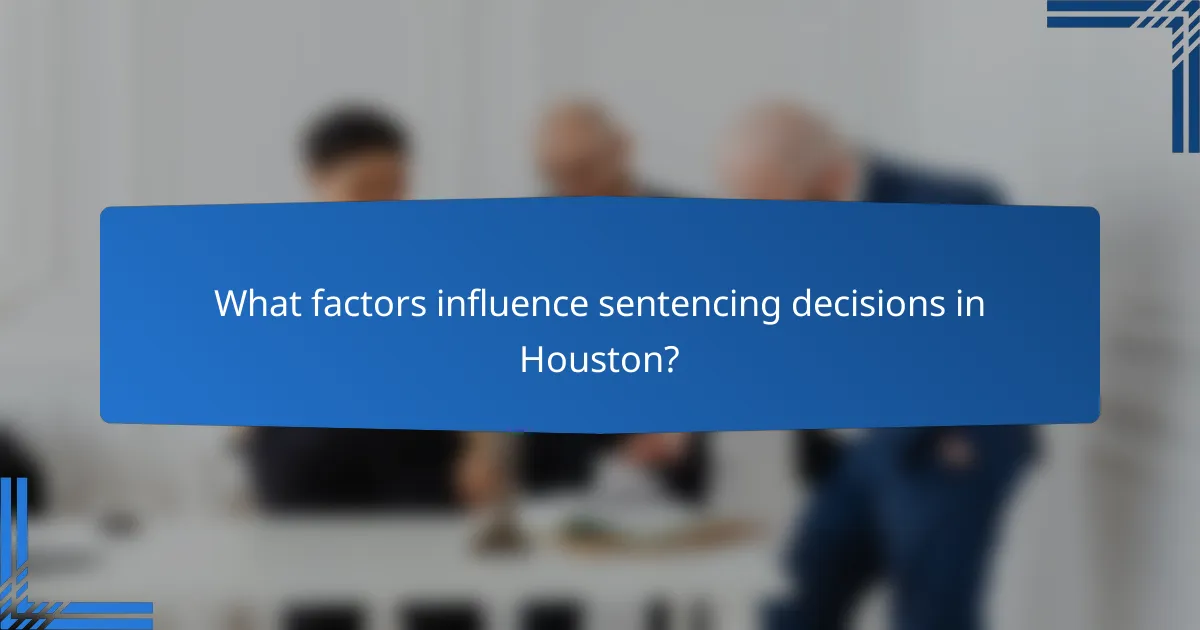
What factors influence sentencing decisions in Houston?
Sentencing decisions in Houston are influenced by various factors, including the nature of the crime, the defendant’s criminal history, and the discretion of the judge. Understanding these elements can help defendants and their attorneys navigate the complexities of the criminal justice system.
Nature of the crime affects sentencing
The specific nature of the crime committed plays a crucial role in determining the sentence. Violent crimes, such as assault or robbery, typically result in harsher penalties compared to non-violent offenses like theft or drug possession. For instance, a first-time offender convicted of a minor drug charge may receive probation, while someone convicted of a violent crime could face several years of incarceration.
Additionally, aggravating factors, such as the use of a weapon or the involvement of multiple victims, can lead to increased sentences. Conversely, mitigating factors, such as the defendant’s age or lack of prior offenses, may result in more lenient outcomes.
Criminal history plays a significant role
A defendant’s prior criminal history significantly influences sentencing outcomes in Houston. Individuals with a history of repeat offenses are often subject to harsher penalties due to the perception of recidivism. For example, a person with multiple DUI convictions may face mandatory minimum sentences compared to a first-time offender.
Judges often consider the severity and frequency of past crimes when determining a sentence. A clean record may lead to probation or reduced charges, while a lengthy criminal history can result in extended prison time or enhanced penalties under Texas’s habitual offender laws.
Judicial discretion can impact outcomes
Judicial discretion allows judges to tailor sentences based on the unique circumstances of each case. This means that two defendants convicted of similar crimes may receive different sentences based on the judge’s assessment of the situation. Factors such as the defendant’s demeanor in court, their willingness to take responsibility, and the impact on victims can sway a judge’s decision.
In Houston, judges have the authority to impose alternative sentences, such as probation or community service, especially for first-time offenders or less severe crimes. However, this discretion can lead to inconsistencies, making it essential for defendants to work closely with experienced legal counsel to advocate for the most favorable outcome.

What are the consequences of violating probation in Houston?
Violating probation in Houston can lead to serious consequences, including the potential revocation of probation and incarceration. Offenses such as failing to report to a probation officer, missing appointments, or committing new crimes can trigger these outcomes.
Violations can lead to revocation of probation
When a probationer violates the terms of their probation, the court may initiate a revocation process. This typically involves a hearing where the probationer can present their case. If the court finds sufficient evidence of the violation, probation can be revoked, resulting in the individual serving the remainder of their sentence in jail or prison.
Common violations include failing drug tests, not completing mandated community service, or not adhering to curfews. Each of these can be viewed as a breach of the conditions set by the court, making revocation a real possibility.
Potential for incarceration if probation is revoked
If probation is revoked in Houston, the individual may face incarceration for the duration of their original sentence. This means that instead of serving time in the community, they could be sent to jail or prison, depending on the severity of their initial offense.
The length of incarceration can vary significantly based on the nature of the original crime and the specifics of the probation violation. For example, a minor violation might result in a short jail term, while a serious breach could lead to several years of imprisonment. It is crucial for individuals on probation to understand their conditions and comply fully to avoid these severe consequences.
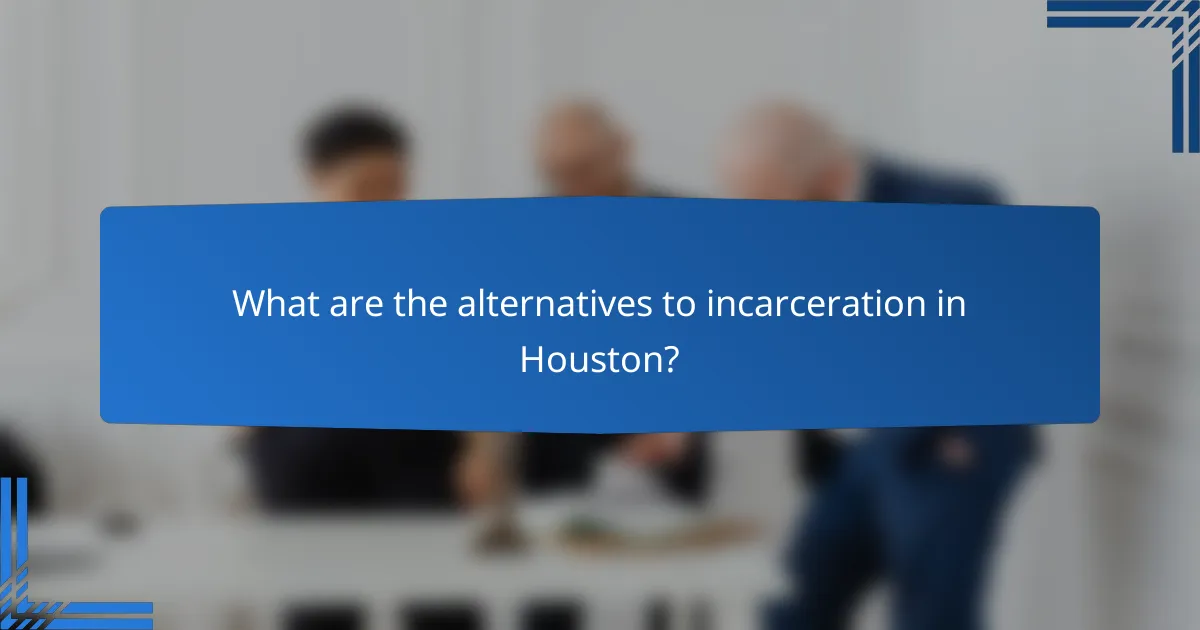
What are the alternatives to incarceration in Houston?
In Houston, alternatives to incarceration include probation, community service, and rehabilitation programs. These options aim to reduce jail time while still holding offenders accountable for their actions.
Community service as a sentencing option
Community service is a common alternative to incarceration in Houston, allowing offenders to contribute positively to society. This option typically involves performing a set number of hours of unpaid work for local organizations or community projects.
Judges may impose community service as part of a sentence for various offenses, especially non-violent crimes. The required hours can range from a few dozen to several hundred, depending on the severity of the offense and the offender’s history.
When considering community service, it’s essential to comply with the court’s guidelines and complete the hours within the specified timeframe. Failure to do so can result in additional penalties or even incarceration.
